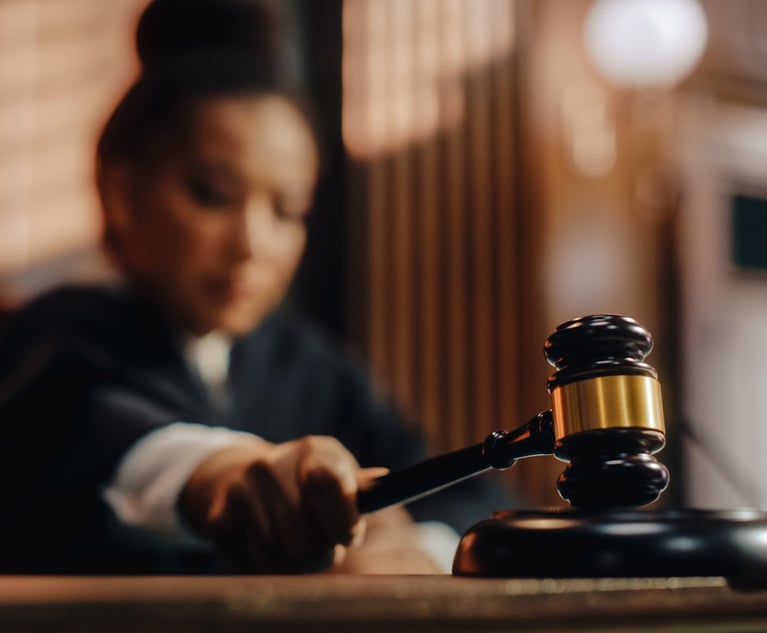Expelled Male Student Can Sue Drexel Over Alleged Bias in Sexual Harassment Investigation
While a male student's racial discrimination claims against Drexel University arising out of a sexual harassment investigation were thrown out, a federal judge ruled he could sue the university for gender bias.
November 27, 2017 at 01:07 PM
7 minute read
 Mario the dragon at Drexel University. Photo courtesy of Drexel University.
Mario the dragon at Drexel University. Photo courtesy of Drexel University. While a male student's racial discrimination claims against Drexel University arising out of a sexual harassment investigation were thrown out, a federal judge ruled he could sue the university for gender bias.
Freshman Karthik Saravanan had a “dysfunctional romance” with a white female peer at Drexel, but the relationship ended acrimoniously, ultimately resulting in him claiming that he was sexually assaulted and his ex-girlfriend, referred to in court papers as J.K., claiming he stalked and harassed her, according to U.S. District Judge Mark Kearney of the Eastern District of Pennsylvania.
Saravanan, who was expelled after the university's investigation, claimed that Drexel exhibited a pro-female bias in such cases, illustrated by the fact that J.K. was retroactively given probation. In his lawsuit, Saravanan, who is Indian, also alleged the university discriminated against him on the basis of race and gender, further claiming that a Drexel official called his rape claim “'ludicrous,'” asking him, “'Why was your penis erect then? Doesn't that mean you enjoyed it?'”
Kearney noted in his opinion the need for balanced judgment when investigating campus sexual assault claims.
“Universities managing disciplinary processes evaluating freshmen students' conduct in a dysfunctional romance must strive to ensure fairness including avoiding inherent bias or procedures which may favor a woman's claim of sexual harassment and stalking over a man's claim of sexual assault by the woman,” Kearney wrote. “We appreciate the disciplinary process is painstakingly difficult in the he-said/she-said drama of a failed romance between college freshmen. But in affording this process, the university must work to ensure accessing and resolving highly charged sexual misconduct claims does not differ based on the gender of the complaining student.”
With that in mind, Kearney held that Saravanan did not adequately show he faced discrimination based on race or national origin under Title VI of the Civil Rights Act. The case was ultimately pared down to a single Title IX claim of erroneous outcome of the disciplinary process, alleging that Drexel's decision to expel him was motivated by gender bias, and a breach of contract claim.
“While Mr. Saravanan's alleged facts indicate bias on the basis of gender, he fails to plead Drexel discriminated against him on the basis of his race, color, or national origin in violation of Title VI or Section 1981. As we will proceed into discovery on the Title IX claim and absent a substantive challenge to his [state law] breach of contract and deceptive trade practices claims, we exercise supplemental jurisdiction over Mr. Saravanan's state law claims,” Kearney said.
Saravanan's attorney, Philadelphia-based Raul Jauregui, said that, under the law, “it's very difficult to state these claims” but Saravanan's case was made easier because he had a lot of friends who testified that their accounts of events were either omitted or inaccurately recorded by Drexel investigators.
Jauregui also lauded Kearney for his treatment of the case.
“I'm extremely thankful for the judge for his concern and care for all the parties,” Jauregui said.
Drexel's lawyer, Michael E. Baughman of Pepper Hamilton, did not immediately respond to a request for comment.
 Mario the dragon at Drexel University. Photo courtesy of Drexel University.
Mario the dragon at Drexel University. Photo courtesy of Drexel University. While a male student's racial discrimination claims against Drexel University arising out of a sexual harassment investigation were thrown out, a federal judge ruled he could sue the university for gender bias.
Freshman Karthik Saravanan had a “dysfunctional romance” with a white female peer at Drexel, but the relationship ended acrimoniously, ultimately resulting in him claiming that he was sexually assaulted and his ex-girlfriend, referred to in court papers as J.K., claiming he stalked and harassed her, according to U.S. District Judge Mark Kearney of the Eastern District of Pennsylvania.
Saravanan, who was expelled after the university's investigation, claimed that Drexel exhibited a pro-female bias in such cases, illustrated by the fact that J.K. was retroactively given probation. In his lawsuit, Saravanan, who is Indian, also alleged the university discriminated against him on the basis of race and gender, further claiming that a Drexel official called his rape claim “'ludicrous,'” asking him, “'Why was your penis erect then? Doesn't that mean you enjoyed it?'”
Kearney noted in his opinion the need for balanced judgment when investigating campus sexual assault claims.
“Universities managing disciplinary processes evaluating freshmen students' conduct in a dysfunctional romance must strive to ensure fairness including avoiding inherent bias or procedures which may favor a woman's claim of sexual harassment and stalking over a man's claim of sexual assault by the woman,” Kearney wrote. “We appreciate the disciplinary process is painstakingly difficult in the he-said/she-said drama of a failed romance between college freshmen. But in affording this process, the university must work to ensure accessing and resolving highly charged sexual misconduct claims does not differ based on the gender of the complaining student.”
With that in mind, Kearney held that Saravanan did not adequately show he faced discrimination based on race or national origin under Title VI of the Civil Rights Act. The case was ultimately pared down to a single Title IX claim of erroneous outcome of the disciplinary process, alleging that Drexel's decision to expel him was motivated by gender bias, and a breach of contract claim.
“While Mr. Saravanan's alleged facts indicate bias on the basis of gender, he fails to plead Drexel discriminated against him on the basis of his race, color, or national origin in violation of Title VI or Section 1981. As we will proceed into discovery on the Title IX claim and absent a substantive challenge to his [state law] breach of contract and deceptive trade practices claims, we exercise supplemental jurisdiction over Mr. Saravanan's state law claims,” Kearney said.
Saravanan's attorney, Philadelphia-based Raul Jauregui, said that, under the law, “it's very difficult to state these claims” but Saravanan's case was made easier because he had a lot of friends who testified that their accounts of events were either omitted or inaccurately recorded by Drexel investigators.
Jauregui also lauded Kearney for his treatment of the case.
“I'm extremely thankful for the judge for his concern and care for all the parties,” Jauregui said.
Drexel's lawyer, Michael E. Baughman of
This content has been archived. It is available through our partners, LexisNexis® and Bloomberg Law.
To view this content, please continue to their sites.
Not a Lexis Subscriber?
Subscribe Now
Not a Bloomberg Law Subscriber?
Subscribe Now
NOT FOR REPRINT
© 2025 ALM Global, LLC, All Rights Reserved. Request academic re-use from www.copyright.com. All other uses, submit a request to [email protected]. For more information visit Asset & Logo Licensing.
You Might Like
View All
People in the News—Jan. 9, 2025—Rawle & Henderson, Armstrong Teasdale
3 minute read


Phila. Court System Pushed to Adapt as Justices Greenlight Changes to Pa.'s Civil Jury Selection Rules
5 minute readTrending Stories
Who Got The Work
Michael G. Bongiorno, Andrew Scott Dulberg and Elizabeth E. Driscoll from Wilmer Cutler Pickering Hale and Dorr have stepped in to represent Symbotic Inc., an A.I.-enabled technology platform that focuses on increasing supply chain efficiency, and other defendants in a pending shareholder derivative lawsuit. The case, filed Oct. 2 in Massachusetts District Court by the Brown Law Firm on behalf of Stephen Austen, accuses certain officers and directors of misleading investors in regard to Symbotic's potential for margin growth by failing to disclose that the company was not equipped to timely deploy its systems or manage expenses through project delays. The case, assigned to U.S. District Judge Nathaniel M. Gorton, is 1:24-cv-12522, Austen v. Cohen et al.
Who Got The Work
Edmund Polubinski and Marie Killmond of Davis Polk & Wardwell have entered appearances for data platform software development company MongoDB and other defendants in a pending shareholder derivative lawsuit. The action, filed Oct. 7 in New York Southern District Court by the Brown Law Firm, accuses the company's directors and/or officers of falsely expressing confidence in the company’s restructuring of its sales incentive plan and downplaying the severity of decreases in its upfront commitments. The case is 1:24-cv-07594, Roy v. Ittycheria et al.
Who Got The Work
Amy O. Bruchs and Kurt F. Ellison of Michael Best & Friedrich have entered appearances for Epic Systems Corp. in a pending employment discrimination lawsuit. The suit was filed Sept. 7 in Wisconsin Western District Court by Levine Eisberner LLC and Siri & Glimstad on behalf of a project manager who claims that he was wrongfully terminated after applying for a religious exemption to the defendant's COVID-19 vaccine mandate. The case, assigned to U.S. Magistrate Judge Anita Marie Boor, is 3:24-cv-00630, Secker, Nathan v. Epic Systems Corporation.
Who Got The Work
David X. Sullivan, Thomas J. Finn and Gregory A. Hall from McCarter & English have entered appearances for Sunrun Installation Services in a pending civil rights lawsuit. The complaint was filed Sept. 4 in Connecticut District Court by attorney Robert M. Berke on behalf of former employee George Edward Steins, who was arrested and charged with employing an unregistered home improvement salesperson. The complaint alleges that had Sunrun informed the Connecticut Department of Consumer Protection that the plaintiff's employment had ended in 2017 and that he no longer held Sunrun's home improvement contractor license, he would not have been hit with charges, which were dismissed in May 2024. The case, assigned to U.S. District Judge Jeffrey A. Meyer, is 3:24-cv-01423, Steins v. Sunrun, Inc. et al.
Who Got The Work
Greenberg Traurig shareholder Joshua L. Raskin has entered an appearance for boohoo.com UK Ltd. in a pending patent infringement lawsuit. The suit, filed Sept. 3 in Texas Eastern District Court by Rozier Hardt McDonough on behalf of Alto Dynamics, asserts five patents related to an online shopping platform. The case, assigned to U.S. District Judge Rodney Gilstrap, is 2:24-cv-00719, Alto Dynamics, LLC v. boohoo.com UK Limited.
Featured Firms
Law Offices of Gary Martin Hays & Associates, P.C.
(470) 294-1674
Law Offices of Mark E. Salomone
(857) 444-6468
Smith & Hassler
(713) 739-1250





